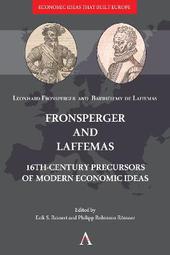
|
Fronsperger and Laffemas: 16th-century Precursors of Modern Economic Ideas
Hardback
Main Details
Description
This volume introduces two unique and hitherto largely unknown contributions published in the 1500s to the making of modern economic knowledge, making them available internationally for the first time in full English translation. Written in 1597, Barthelemy de Laffemas' General regulation for the establishment of manufacturers (written originally in French: Reiglementgeneral pour dresser les manufactures) represents one of the earliest voices in the history of political economy, arguing that manufacturing and industry are the true source of the wealth of nations and that states should pursue an active industrial policy (also known as 'mission-driven' policies). Located at the crossroads between medieval Scholasticism and early mercantilism, it presents a political programme that would lead to French economic development, providing the foundations for the French industrialisation programme during the 1660s-1680s. Laffemas presents a simplified version of an infant industry argument and European standard model of economic development known from thoughts of Enlightenment thinkers such as Sir James Steuart, Friedrich List's National System of Political Economy (1841), nineteenth and twentieth-century neo-mercantilism and twenty-first century 'industrial policy' or 'mission-driven' policies (M. Mazzucato). Leonhard Fronsperger'sOn the praise of self-interest (German original: Von dem Lob dess Eigen Nutzen, 1564) is the first documented instance of the 'Mandeville paradox', one of the key axioms in modern economics literature. Commonly associated with much later writings, including Bernard de Mandeville's Fable of the Bees (1705/14), or Adam Smith's Theory of Moral Sentiments (1759) and Wealth of Nations (1776), German military surgeon and polymath Fronsperger argued in 1564 that self-interest is what drives the world. Vested in Renaissance Humanism and directly associated with the master of his time - Erasmus von Rotterdam - Fronsperger develops Renaissance theory about homo faber (creative, driven humans) as the centre of the world to perfection, deriving from it the logical conclusion that possessive individualism and self-interest are the true forces moving the human economy forward. Without letting go of the state, this work argues for self-interest facilitating virtuous cycles of enrichment and positive economic development.
Author Biography
Erik S. Reinert is Professor of Technology Governance and Development Strategies, Tallinn University of Technology. He is also Honorary Professor, Institute for Innovation and Public Purpose, University College London. Philipp Robinson Roessner is Professor (chair) of Early Modern History, The University of Manchester.
|